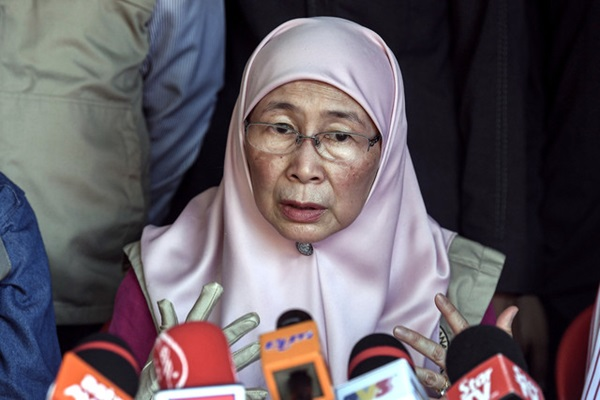Pneumonia outbreak in Kuala Koh not associated with mining activity - DPM
GUA MUSANG, June 14 (Bernama) -- Deputy Prime Minister Datuk Seri Dr Wan Azizah Wan Ismail said the pneumonia outbreak among the Orang Asli from the Batek tribe in Kampung Kuala Koh here was not due to the manganese mining activity.
She said the test results released by the Chemistry Department on June 12 showed that the overall quality of water in the sampling area, that is in Lebir river, was in compliance with the National Water Quality Standard for Raw Water.
“The June 12 results also found no pollution from palm oil waste, pesticides and herbicides.
“Investigations carried out by the Department of Environment also found no manganese mining waste disposal at Felda Aring 10, which is located about 10 kilometres from the Orang Asli settlement in Kuala Koh.”
She said this to reporters after visiting the area and being briefed about the situation at the National Disaster Management Agency (NADMA) operation centre at Dewan Felda Aring 10 here today.
However, Dr Wan Azizah said the government through the Ministry of Health would continue trying to find the actual cause of the pneumonia outbreak in the Orang Asli settlement.
“This is a new phenomenon which has never occurred among the Orang Asli community before. We want to know the cause of the outbreak which has resulted in sudden deaths of the Orang Asli because we have also found out that they have been facing chronic health issues over the recent years.
“The lab test results are expected to be available soon as they (investigation team) are in the midst of identifying the microorganisms from the samples taken from the patients and the bodies,” she said.
Meanwhile, Dr Wan Azizah said the government was also mulling ways to help the Orang Asli community to live a better life.
“One of the reasons is because their foraging area has become smaller, causing them to get less source of protein to the extent of facing malnutrition. They are also losing their source of income because of that.
“That’s why we have to think about how to solve the issues of modernisation and poverty affecting the Orang Asli,” she said,
At the same time, Dr Wan Azizah, who is also Women, Family and Community Development Minister, said apart from medical treatment, the government was also providing counselling to the family members of victims to ease their anxiety.
“So far, we have opened a temporary relief centre at the former Ethnobotany National Service Training Camp at the Ethnobotany Park in Gua Musang to house the Orang Asli patients after they were discharged from the hospital.
“The camp can accommodate 400 people at one time but their movements will be limited as many aspects pertaining to the outbreak of the disease are still being investigated,” she said.
Dr Wan Azizah, who is also the National Disaster Management Committee chairman, said the government would also consider giving compensation to the families of the deceased Orang Asli, but the matter would be finalised after all investigations were concluded.
She said any quarters wishing to make donations can do so by sending essential items, such as food supply and personal hygiene kits to the Gua Musang Social Welfare Office or the aid collection centre in the operation area.
“However, we are restricting the area to the public following the Red Zone declaration made by the Kelantan Police chief Datuk Hasanuddin Hassan recently,” she added.
Earlier, the deputy prime minister presented donations to the Orang Asli from the Batek tribe who were affected by the outbreak of the disease.
Also present were Domestic Trade and Consumer Affairs Minister Datuk Seri Saifuddin Nasution, Minister in the Prime Minister’s Department Senator P Waytha Moorthy and Minister of Water, Land and Natural Resources Dr Xavier Jayakumar.
The latest statistics showed that 103 Orang Asli have received treatment for the disease as at June 13, with 56 receiving outpatient treatment, 42 warded in normal wards, and five in the intensive care units of Gua Musang Hospital, Kuala Krai Hospital and Raja Perempuan Zainab II (HRPZII) Hospital in Kota Bharu.
Of the total, 53 were children below the age of 12.
-- BERNAMA
HealthEdge
EXCLUSIVE

Pet Vaccination, Public Awareness And Surveillance Key Towards Rabies-free Southeast Asia - Experts
KUCHING, Dec 11 (Bernama) -- The goal of making Southeast Asia free from human rabies can be achieved through a total understanding of the disease, how it can be prevented and responsible pet ownership among communities, say experts.
read more ››IN FOCUS

TAVI KAEDAH BAIK PULIH INJAP JANTUNG TANPA PEMBEDAHAN




